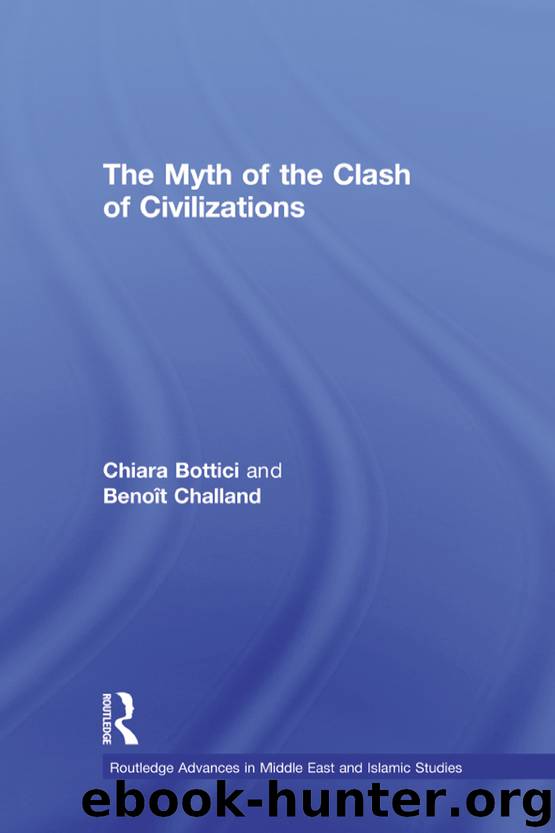The Myth of the Clash of Civilizations by Bottici Chiara; Challand Benoît;

Author:Bottici, Chiara; Challand, Benoît;
Language: eng
Format: epub
Publisher: Routledge
4.2 Colonial and post-colonial struggles
Rodinson concludes his diachronic study of the western perception of Islam by stating that eurocentrism and nineteenth-century orientalism lose ground with the emergence of the powerful autochthonous nationalist and/or anti-colonial movements in the Middle East. This is the period of the emergence of influential Islamist thinkers (so-called modernist thinkers). As highlighted in the seventh validating technique (playing with fear) with the discussion of Masud’s typology of Islamic reactions to the imposition of secular regimes, it should be clear that the surge of Islamist ideologies in the twentieth century is owing to political factors and is not the emanation of a permanent ‘Islamic essence’. Various Islamist ideologies would gradually grow stronger with time as much as their reaction became rooted not only in local (national) uprisings (most of the Islamist groupings started as nationalist movements) but also in the internationalization of political struggles in the whole Middle East. The fact that Islamist ideologies are precisely pitted against the western powers, the trouble-makers for local societies par excellence, for historical and political reasons, shows the power of the politics of the myth of the clash between Islam and the West.
One of the clearest definitions of Islamism is provided by a non-specialist in the field, Susan Buck-Morss – a theorist of visual culture and a proponent of critical theory in the USA. In her words, Islamism ‘is the politicization of Islam in a postcolonial context, a contemporary discourse of opposition and debate, dealing with issues of social justice, legitimate power, and ethical life in a way that challenges the hegemony of western political and cultural norms’ (Buck-Morss 2003: 2). Politics is thus intertwined with alternative metaphysical views.
On this point, it is worth quoting the conclusions that Zaidi reaches in his study of the so-called ‘Islamization of knowledge’, an attempt by various Islamic and Islamist intellectuals to frame knowledge outside of the dominant western categories and methods:
Is there more than an ounce of truth in [Sayyid] Qutb’s denunciation of modernity as an Age of Jahiliya, an Age of Ignorance, because of modernity’s reliance upon a strictly rationalist-empiricist epistemology that repudiates the authority of metaphysical truths (Euben, 1997: 434–45)? In Qutb’s view, an epistemology that wilfully rejects God’s authority and revealed Truth renders life meaningless because questions such as ‘Why are we born?’, ‘How should we live?’ and ‘Why do we die?’ lie outside the domain of rationally empirically verifiable truth. It is unfortunate that much of the academic literature (Euben’s account being exceptional) on ‘Islamic fundamentalism’ has, like the journalistic accounts that we often dismiss, failed to reach beyond the rhetoric of these ideologues. Even if Mawdudi’s and Qutb’s ideological rejections of modernity offered little in the way of systematic reconstruction, they were crucial in giving voice to the alienation experienced under increasing cultural penetration.
(Zaidi 2006: 73f.)
The inner core of most Islamist movements is thus the promotion of a competing view about the world, one that emerges mostly out of the post-colonial context and very often in rupture with western models and praxis.
Download
This site does not store any files on its server. We only index and link to content provided by other sites. Please contact the content providers to delete copyright contents if any and email us, we'll remove relevant links or contents immediately.
| Africa | Americas |
| Arctic & Antarctica | Asia |
| Australia & Oceania | Europe |
| Middle East | Russia |
| United States | World |
| Ancient Civilizations | Military |
| Historical Study & Educational Resources |
Empire of the Sikhs by Patwant Singh(23086)
The Wind in My Hair by Masih Alinejad(5095)
Rise and Kill First by Ronen Bergman(4790)
The Templars by Dan Jones(4689)
The Rape of Nanking by Iris Chang(4214)
12 Strong by Doug Stanton(3551)
Blood and Sand by Alex Von Tunzelmann(3205)
Babylon's Ark by Lawrence Anthony(2682)
The History of Jihad: From Muhammad to ISIS by Spencer Robert(2631)
No Room for Small Dreams by Shimon Peres(2368)
The Turkish Psychedelic Explosion by Daniel Spicer(2360)
Inside the Middle East by Avi Melamed(2357)
Gideon's Spies: The Secret History of the Mossad by Gordon Thomas(2354)
Arabs by Eugene Rogan(2301)
The First Muslim The Story of Muhammad by Lesley Hazleton(2275)
Come, Tell Me How You Live by Mallowan Agatha Christie(2262)
Bus on Jaffa Road by Mike Kelly(2160)
Kabul 1841-42: Battle Story by Edmund Yorke(2031)
1453 by Roger Crowley(2031)
